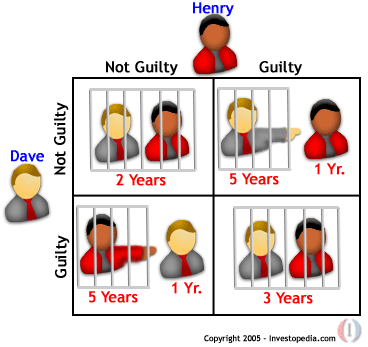When I think about the world I would like to leave to my daughter and the grandchildren I hope to have, it is a world that moves away from unequal, unstable, unsustainable interdependence to integrated communities – locally, nationally and globally – that share the characteristics of all successful communities.”
Bill Clinton, former President of the United States.
The Prisoner’s Dilemma
Although it is a simple mathematical idea, it turns out to be an enchanted trap that has ensnared some of the brightest minds for decades.”
The above and following quotes on the Prisoner’s Dilemma are taken from, Super Cooperators: Altruism, Evolution, and Why We Need Each Other to Succeed, by Martin Nowak and Roger Highfield.
Imagine that you and your accomplice are both held prisoner, having been captured by the police and charged with a serious crime. The prosecutor interrogates you separately and offers each of you a deal. This offer lies at the heart of the Dilemma and goes as follows:
- If one of you, the defector, incriminates the other, while the partner remains silent, then the defector will be convicted of a lesser crime and his sentence cut to one year for providing enough information to jail his partner. Meanwhile, his silent confederate will be convicted of a more serious crime and burdened with a four-year sentence.
- If you both remain silent, and thus cooperate with each other, there will be insufficient evidence to convict either of you of the more serious crime, and you will each receive a sentence of two years for a lesser offense. If, on the other hand, you both defect by incriminating each other, you will both be convicted of the more serious crime, but given reduced sentences of three years for at least being willing to provide information.
- … there is a simple central idea that can be represented by a table of options, known as a payoff matrix. This can sum up all four possible outcomes of the game, written down as two entries on each of the two lines of the matrix.”
The image at the top details this payoff matrix. It varies from the above description slightly: If one of the prisoners incriminates his fellow prisoner, and the incriminated prisoner does not likewise reciprocate this defection, then the incriminated prisoner will receive a five year sentence instead of a four year one.
The Global Economic Crisis
In the face of this tension between increasing interdependence and uncoordinated actions, we need shared visions of the future. These visions can motivate leading decision makers to contribute voluntarily to the global good, out of a sense of shared responsibility and enlightened self-interest.”
– Global Economic Symposium
The Prisoner’s Dilemma works on the basis that two parties are interdependent. In economics the global economy is interconnected and thus interdependent. The global economic crisis can therefore be viewed as a form of the Prisoner’s Dilemma, where many participants are each charged with a serious crime (the crisis) and each must then choose how to conduct themselves to exit it, with each player’s decisions affecting all the other participants.
However, unlike the classic example above, one market cannot simply defect from the rest of the global economy. Regardless of the decisions the players make, they still remain interconnected and interdependent.
The Eurozone debt crisis has fallen into a classic prisoner’s dilemma. One party does not cooperate because it would expose itself to the potential non cooperative decision of the other party, the latter of which would be able to extract a greater payoff than the cooperative solution would yield in the short-term.
Fear of losing control over the political decisions taken by the euro area is triggering a series of rational (but sub-optimal) choices incapable of dealing with the core issues of the crisis and so leading to an outcome/equilibrium that no one really wants (and everyone will regret ex post), i.e. the total or partial break-up of the euro area.”
The following video gives an example of the Prisoner’s Dilemma with arms proliferation between nations:
What Do You Think?
Is the global economic crisis an example of the Prisoner’s Dilemma? And if so, how can the best outcome (sustainable equilibrium) be achieved?
Image: gametheory by Student Computing Support.

